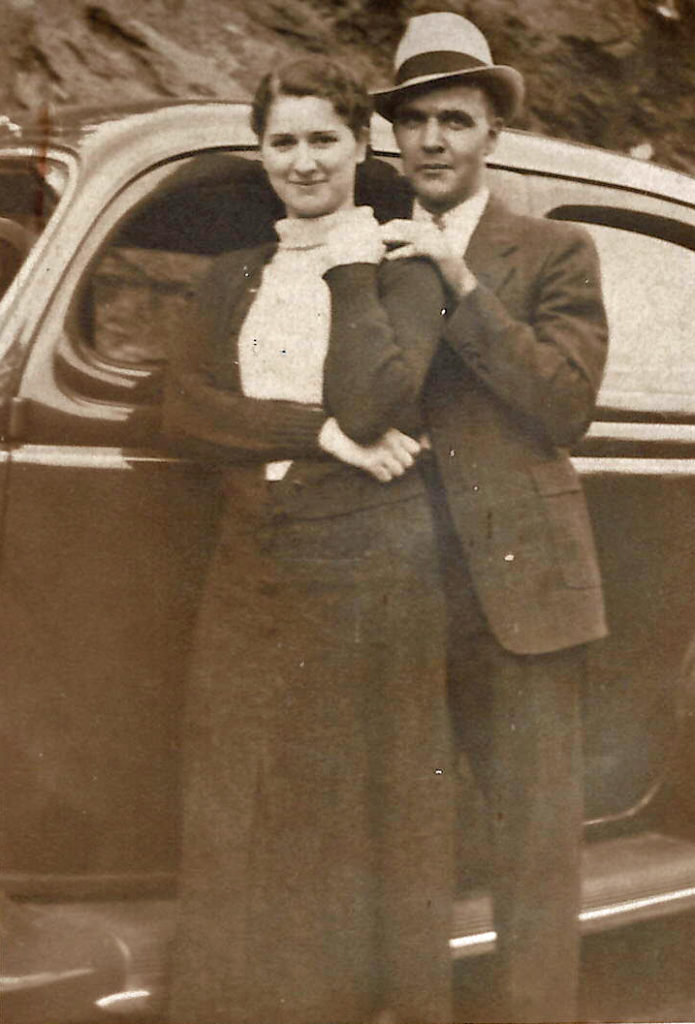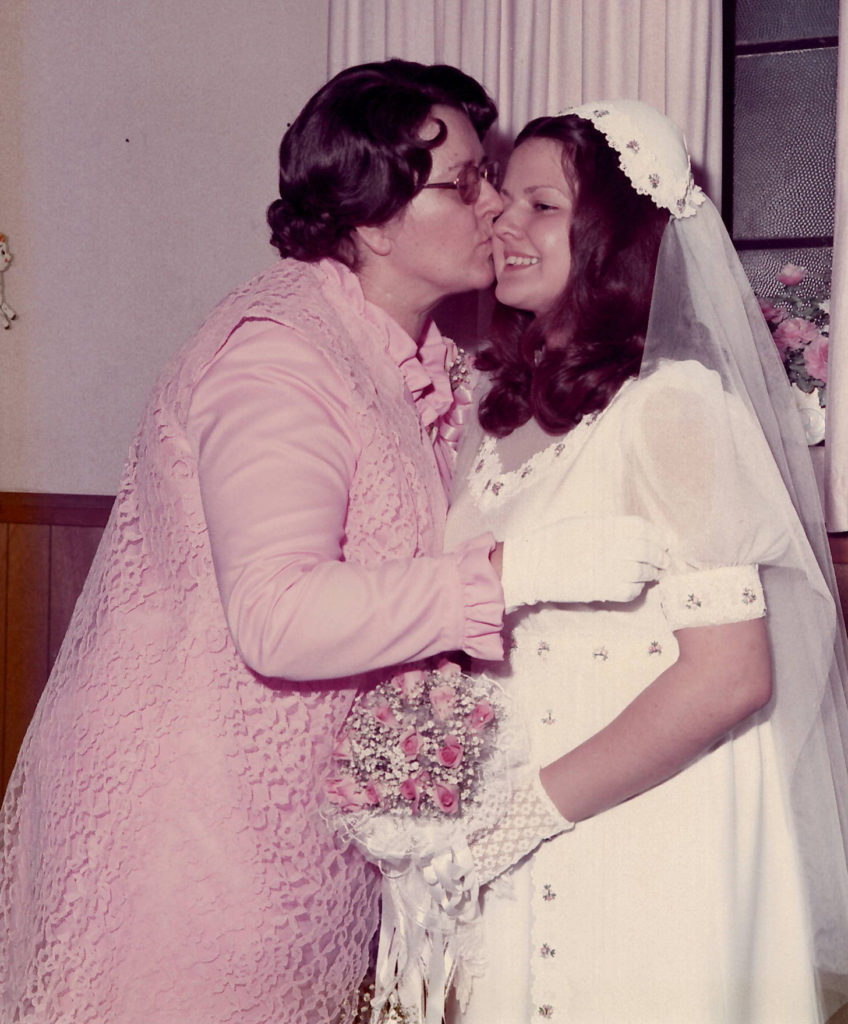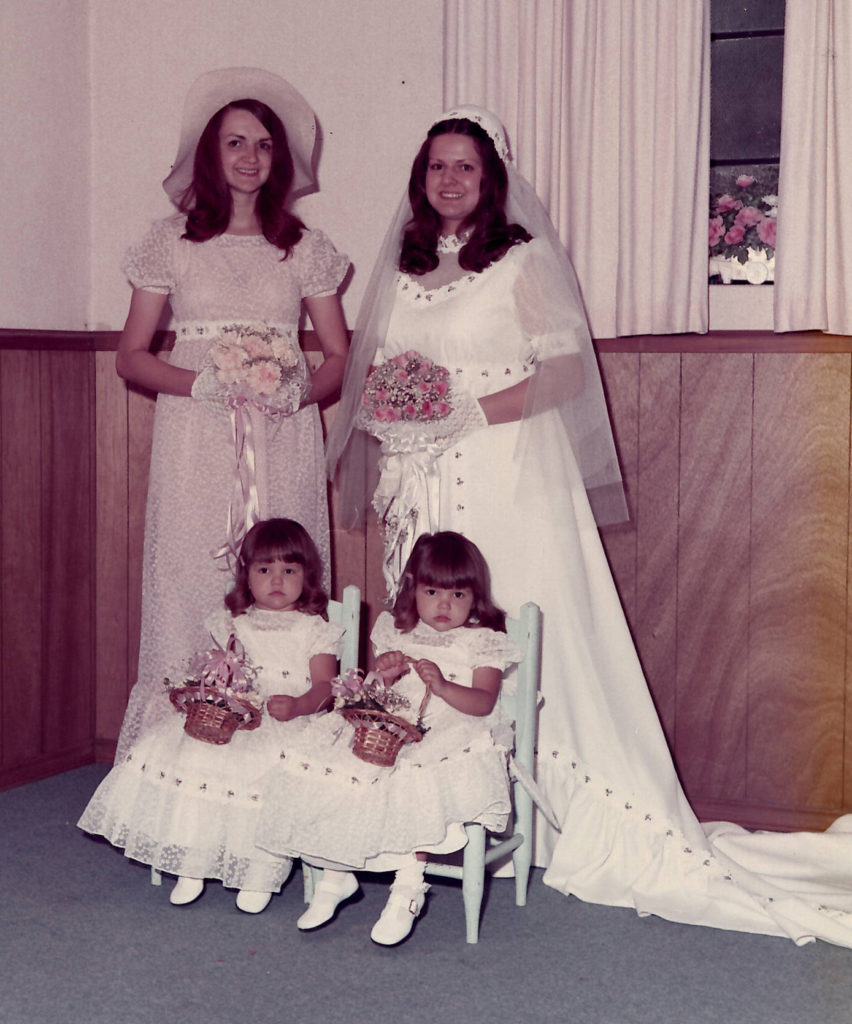Chapter 23 Mama
The desire of my heart in writing this book was to chronicle my relationship with my dad, beginning in childhood, continuing into adulthood and culminating with the five years I served as his caregiver. Ultimately, my objective was to present caregiving in a positive light – not as a burden as it is often referred to. I realize I had ideal circumstances – a sweet and loving dad who was hardly ever difficult; family members to help; no childhood baggage that would have made the situation difficult (such as mistreatment). It was a joy and an honor from which I am still reaping benefits. Serving as a caregiver changed my life in an abundance of beneficial ways and I will always be grateful that God allowed me to take care of daddy.
That being said, I could not write a book about Daddy without devoting some space to my lovely mother, Olive Rodema Zachary Wright. Mama was born on July 19, 1914 less than 20 miles from where she lived most of her married life. Her dad was a farmer. She had an older sister and a younger brother who both died during the influenza epidemic of 1918. She and six brothers grew up together on a farm far from town. She walked to a country school and loved learning – especially reading and arithmetic. Her childhood and young adulthood were not easy, but she learned skills she would hone the rest of her life. Cooking, writing and sewing come to mind; she was adept at all three.
In the following poem, Mama reminisces about her childhood. She wrote it in 1977 when she was sixty-three years old:
The Little Country School House
Travel with me backwards if you will
Down memory land to Center School, house on a hill.
It was built in walking distance of our neighborhood;
Surrounded by small streams, pastures and woods.
We walked through paths, over small streams and through fields.
Under fences, crossed foot logs, and over the hills.
With a lard bucket for lunches, a cloth sack for our books,
We dressed for warmth and not for looks.
Long union suits, bloomers, high top shoes,
Jolly, happy and friendly; never heard of the blues.
At the tap of the bell, we assembled in the Big Room,
Had our devotions, sang a friendly tune.
Songs like “America” and “Ain’t Gonna Study War No More,”
“Tenting Tonight” and “Old Black Joe.”
At recess we played gully-bird, ball, and see how high you can jump;
Or “revival meeting” with Talton Whitehead preaching from a stump.
If we tore our clothes, they were mended and wore some more
For not often did we get bought-ones straight from the store.
When things got tough and there was not much to eat,
Brother “Linnie” would go out and shoot us some meat.
The way Mama fixed it on our stove that used wood
With hot biscuits and gravy, it sure was good.
At home in the evening – chores all done, supper over and dishes put away,
We lit the oil lamp and paused while Papa read and prayed:
“Thank you for our blessings, keep us through the night
Rest us for tomorrow, make everything all right.”
Then to bed and dreamland; all too soon we heard Papa say,
“It’s time to get up and dressed for another day.”
We went to get some knowledge; we learned our lessons well.
As fulfillment in the future, our lives most surely tell.
We never thought of germs as we drank spring water
From the one dipper in the pail;
When arithmetic was hard, the boys volunteered to bring in some wood;
This tactic never seemed to fail.
The old wood stove was a fine place to warm your hands and nose,
While on your backside you practically froze.
If you had to be excused, you took off on a run
Down a short winding path to the outside “john.”
We looked forward to Fridays and a special treat –
A Spelling Bee with each one anxious to beat.
When Christmas time came we had loads of fun
Saying all our piece, and a gift for everyone.
For entertainment, not much money but plenty of time –
Taffy pulling parties, quilting bees, and corn shuckings were fine!
Swapping work with neighbors; helping where there was a need,
The women folk visiting while cooking a bountiful feed.
From our little Center School house to our modern colleges and T.I.A’s*
Education has certainly changed in a myriad of ways.
From the horse and buggy to the Model-T Fords,
Supersonic jets, man on the moon and three or four wars.
Good times and bad times and we’ve made it through.
But I wouldn’t want to turn back and stay, would you?*
* Refers to the Technical Institute of Alamance – our community’s first technical college
After meeting at the textile mill in Belmont, she and Daddy “ran off” to the nearby small town of Asheboro on a Sunday night in October 1936, to be married by a woman preacher after the evening church service. Mama was 22; Daddy was 25. They honeymooned at Lake Junaluska.

After living in the little cottage in Uncle Joe’s backyard in Burlington for some time, they moved to the newly purchased farm with baby Elizabeth in tow. (Their firstborn, Wilbur Boyd was stillborn.) Mother set up housekeeping, Daddy worked in the mill. Mother was also astute with farm chores such as feeding chickens, gathering eggs, and when needed, chopping off the heads of those chickens, plucking off the feathers and cutting them up to fry.
When Daddy was laid off from the hosiery mill when I was in the first grade, mother took up the slack by returning to the only full-time job she would ever know – working in the hosiery mills that were the backbone of our community’s economy. There was no glamour and little to enjoy, but she made the best of it. “Piece work” was probably the hardest aspect – being paid by how many sock toes or panty hose crotches you could sew in eight hours. No lingering around the water fountain, catching up on the latest news…piece workers had to be on their toes (no pun intended). Most Fridays, when she received her weekly paycheck, she would stop by the grocery store on the way home, stocking up on the staples not grown on the farm for her hardworking farmer and five growing daughters. Often, she would bring home a five-cent candy bar for us girls to share – cut into five equal pieces. Yum. Those were the days.
It was obvious that she and Daddy loved each other. Their marriage was a good one. They slept in separate full-size beds that were side by side. Mother told me once that was so she could sleep with the youngest and the second youngest would sleep with Daddy – to keep warm. There was no heat upstairs. I can still remember cuddling up with Mama to go to sleep. I developed the habit of pinching one of her ear lobes while I drifted off…when it became sufficiently warm (because it was ice cold when I first grabbed hold), I would switch to the other ear and warm it up as well. Comforting for me; Mama never complained. Sixty years later, I was delighted when my grandson, Ezra Zachary Diaz, also developed the habit of ear lobe pinching.
Another vivid memory is of mother singing me to sleep while holding me in her lap in her well-worn rocking chair. The words of one song – “I Will Sing of my Redeemer” – puzzled me. My young mind wondered: Why does Mama sing about Rodema (my sweet older sister whom I affectionately thought of as “my second mama”) when she is rocking me? It took me a few years, but I finally realized the difference between “Redeemer” and “Rodema” and understood that Mama was singing about her Savior.
Mama spent a great deal of her time sewing. She made gorgeous apparel (often matching) for her daughters, outfitted herself in plain but attractive garments, and stitched all sorts of attire for extended family, neighbors and friends. To this day I still run into people whose first words of greeting are, “Your mother used to sew for me.”
Once I ran across her “price list”: five cents for a hem; a penny per buttonhole; maybe up to one whole dollar for a fancy dress. Her sewing machine always sat in one corner of our big country kitchen – the room we basically lived in. I remember how excited she was when she got a new modern one with special attachments and stitches. She could fashion any desired ensemble and do it quickly. My senior year of high school, I came home on Friday with the news that the boy I had been waiting for finally asked me to the senior prom…which was scheduled for Saturday night. Rodema took me shopping – for fabric. I brought home yards of yellow dotted Swiss and chiffon, and by the next evening Mama had turned them into a lovely, flowing prom dress – long full sleeves, an empire waist and flowing skirt. She was amazing. And of course, she made my wedding dress (as well as the attendants’ dresses and her own fancy pink lace frock). I put together a composite design from three different pictures I had cut out from bridal magazines. Mama created an exact replica down to the ruffled train, white lace and pink rosebud trim and a Juliette headpiece for the veil.


Juli and Jenni.
I regret that I never asked her to teach me to sew, but I will always remember the standard she set for a sewing job well-done: look on the inside for lingering threads…they were a sign of sloppy sewing. To this day, when I sew (I taught myself), I am never satisfied that an item is finished until I have snipped all stray threads.
Mama also had the ability to stretch a dollar as far as it could possibly go. She spent her meager salary wisely and never bought anything she did not consider a bargain. That meant good quality at a fair price. When she invested in something, she expected it to prove its value. As she grew older, she actually bought a few ready-made outfits…which leads me to this letter she wrote to a clothing company in 1992.
To Whom It Concerns:
I’m Olive Wright, 78 years old, been married to the same man for 57 years in October. We have five daughters, five sons-in-laws and 14 grandchildren.
We were raised on farms by hard working parents in the ‘20s. We finished high school. It was considered the Age of Depression. We went to Burlington twice a year to buy clothing, either by horse and buggy or one of the new Fords. We were poor but so was everyone else. We were happy and always worked hard.
Boyd and I married in 1936. After I had our first baby, some of my neighbors got me to hem a dress or fix something. They knew I could sew and they said I should take in sewing. I used to make a child’s dress for 35 cents and a lady’s dress for 75 cents. If I made them with bound buttonholes down the front it was $1.00.
Until I was 40 I stayed at home, raising our girls. My husband worked in a knitting mill making hose. After our youngest started to school, I learned to drive and went to work in the mill sewing men’s socks. I was 42 years old. My husband had just been laid off his job and started raising chickens. I still served as a grade parent for our girls when they were in school. I made pretty dresses from the flowered feed sacks. I made all their clothes when they were small. Their teachers at PTA always said they always looked nice and were well behaved.
We brought them up to attend church. It wasn’t easy but we managed to give them a good Christian education. When they married, I made all the wedding dresses except one (she wore one that her sister-in-law had made.) I also made most of the bridesmaid dresses and all my dresses for their weddings.
Two years ago this past February, I had a stroke. I had fallen and broken my pelvic bone, but it was 3 months before a doctor discovered what was causing me such severe pain. I now walk with a walker. My husband is 81 years old and we still live on the farm but 3 of our girls and their families live nearby.
I had gotten some money for Christmas and I was looking for a wool suit to wear to church to keep me warm. I was so glad to find one at Moon’s Department Store in Graham, NC. They were going out of business. It was a size 24 and it fit perfect. The suit is red and black and it was wool crepe. We got caught in the rain the first time I wore it and there were rain spots all over it. I was very upset. I called the dry cleaners. They said they thought they could get the spots out. I took it to the cleaners and they did get the spots out. The first time I wore it after that, the suit didn’t feel quite right. The sleeves seemed to be shorter and the shoulders felt funny. When I got home I raised up the lining and the shoulder pad was all messed up and the lining was raveling. The shoulder pads looked very cheap, just a piece of foam rubber covered with pelon. The suit retailed for $500 I paid $160.00 for it. I was ready to cry. I would expect a suit that retails for $500 to be the best of everything. I would like the suit replaced or my money back. If you replace the suit, I would prefer some wool in it but not wool crepe. I also do not want a black and white checked suit. It was a beautiful suit.
Thank you,
Olive Wright
The company sent Mama a new suit! (Wouldn’t you have?)
We were living in Brooklyn when Mama wrote that letter…and we were still there three years later when she suffered her second stroke. Although initially I had discussed with Randy the possibility of my moving home to take care of her, God chose our daughter Rachel to be her caregiver. Rachel had the privilege of being with her Grandma during Mama’s last two months, as well as standing by her bed when she was called Home, just a few days before Daddy’s eighty-fourth birthday. We drove down from Brooklyn the next day for the funeral. Home was so different without Mama. Daddy was very sad and a little helpless, having had her to take care of him for almost 60 years. Rachel decided to stay in North Carolina for a while and help him adjust. She returned to Brooklyn in February of 1996.
It has been good to reminisce about Mama. She was an extraordinarily smart and talented woman. Often she lamented that she had always wanted to write a book. Well, Mama, it has been a pleasure to include a few of your writings in this chapter.